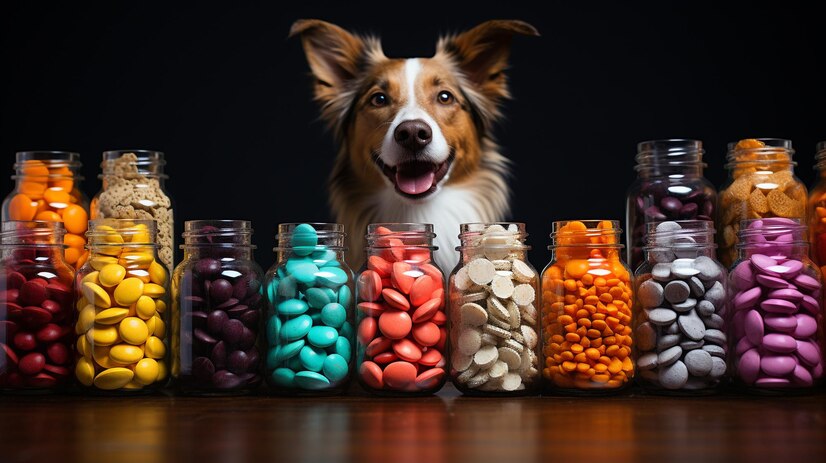The Best Multivitamins for Dogs: A Comprehensive Guide to Optimal Canine Health
As pet owners, we strive to make our dogs live a long, happy, and healthy life. A good diet is important, but sometimes even the most balanced might be deficient in some basic nutrients. That’s where multivitamins play a significant role. How do you identify the best multivitamins for dogs that are needs-bettering?
In this article, we will unveil why vitamin supplements are necessary, their advantages, the top nutrients to look for, and how to pick the right one for your pet. Be it a puppy that is panting or an old dog who is chillin’, this guide will be of great help in your decision-making.
Introduction: Important Reasons for Dogs to Use Multivitamins
Nothing is going to keep your dog’s health performing like his diet plus regular exercise if you are a rational person. The basic dog food that is of good quality gives your puppy most of the nutrients that are required, but there are instances when they may need extra help. Multivitamins for dogs are the best option. Even if it is due to the age factor, the ailment problems, or a particular living style, the use of these best multivitamins for dogs can guarantee that your dog, no matter how old, will stay as lively, healthy, and joyful as ever.

How to Choose Suitable Multivitamins for Dogs?
Multivitamins are dietary supplements that ensure your dog is covered in case there are any shortcomings in the dog’s diet. The best dog food may have it all, however, in some cases, certain vitamins and minerals, especially for dogs with individual health needs, dietary limitations, or certain life stages, might be lacking.
Along with this, farming and processing methods are sometimes enriched by such procedures and cause a loss of basic nutrients, thus making supplementation a must. Multivitamins also offer your dog a balanced diet of key nutrients which in turn facilitates the physical wellbeing, energy, and treatment of their immunity system.
This complete guide answers all your questions about dog vitamins, including their benefits, key nutrients, top brands, and the factors to consider when choosing a product. Whether you are a new pet holder or you seek to improve your dog’s general health, this article, the story of a dog’s journey to well-being will leave no stone unturned.
How to Choose the Right Multivitamin for Your Dog?
To find the best multivitamin first you need to take into account your dog’s problems:
Life stage:
Puppies are different from adults; adults, on the other hand, have different nutritional requirements.
Size and breed:
Specially a large breed might need extra support for their joints.
Dietary preferences:
You can choose between chewable tablets, powders, or liquid form.
Specific health concerns: Dogs that are allergic or have chronic conditions are supposed to take formulas with some added ingredients related to their health.
You should always discuss this with your veterinarian before you start your pet on any new supplements
Why Multivitamins Are Important for Dogs?
Multivitamins are developed to slip in and close up any nutritional loopholes that your dog might have left in its diet. Even the best dog foods may not have enough different vitamins and minerals, particularly in dogs with conditions that require special nutrition, restricted diets, or specific life stages.
Moreover, present-day farming techniques and food processing can do away with the necessary nutrients, thus, supplementation becomes indispensable. Multivitamins make sure your dog is fed a balanced diet of the main nutrients which will be the key to his or her health, energy, and immunity.
This thorough guide contains everything you may want to know about multivitamins for dogs including their benefits, key nutrients, top products, and also the factors to be considered while choosing one. Whether you are a first-time pet owner or just want to enhance your dog’s general well-being, this article is a combination of both.
Benefits of Multivitamins for Dogs
Let’s start by analyzing why multivitamins are a precious inclusion in your dog’s day-to-day life.
1. Fills Nutritional Gaps
Even top-shelf dog foods may be poor in some vitamins or minerals, especially when your dog has definite dietary instructions or favorites. Multivitamins can be used as a bridge in these nutrient-deficient dogs, thus helping them attain optimum health.
2. Supports Vital Functions
Some of the main nutrients such as vitamin D, B-complex, and omega fatty acids are necessary for healthy skin, a shiny coat, strong bones, and proper muscle function.
3. Boosts Immunity
Vitamins C and E antioxidants are the ones that boost your dog’s immune system efficiently, thus enabling them to combat infections and evade serious diseases faster.
4. Promotes Healthy Aging
Older dogs are very much affected by age-related health problems like joint pain and degeneration of their brain. Multivitamins containing glucosamine, chondroitin, and omega-3 fatty acids alleviate their suffering and they thus, live more fulfilling lives.
5. Enhances Energy and Vitality
The mare with more stamina will be able to outrun the other fillies when running a race. Multivitamins in their diet make sure they have the energy to stay active and joyful.
6. Improves digestion:
These probiotics and enzymes improve the condition of the nutrient absorption process.
Best Multivitamin Supplements for Dogs: Keep in Mind Features While Choosing
There could be so many things to think about when choosing a multivitamin for your dog to make it the best choice.
1. Broad Formulation
Most best multivitamin supplements include the following nutrients:
Vitamin: Includes (A, all B-complex, C, E, D, and K), Calcium, Phosphorus, Magnesium, and Zinc Omega 3 and Omega-6 to help promote healthy skin & coat Special Additives: such as glucosamine for joints and probiotics for digestion.
2. Specific Stage of Life
Dogs require nutrients depending on their age: each will require a different amount of nutrients according to the stage of life, as such:
- Due to their rapid growth demands, puppies require high levels of calcium and phosphorus.
- On the other hand, adults benefit from formulas designed for balanced maintenance.
- Meanwhile, senior dogs need glucosamine, chondroitin, and antioxidants to manage the effects of aging effectively.
3. Formulation and Flavor
Choose a product that would be easiest for your dog to take it be chewable tablets (Tablet), powders or liquid drops. Comes flavored (chicken or peanut butter) for those finicky eaters.
4. Trustworthy Brand
Products must only be of the reputed manufacturer and for that, it need to go through stringent safety and quality standards as FDA or NASC (The National Animal Supplement Council) certifications.
5. Vets Approval
So in case your dog already has any condition, consult your vet before giving this supplement.
In the same manner, we can solve it for a different combination of the input.
Signs Your Dog Might Need Multivitamins
Signs Your Dog Might Need Multivitamins
Not all fur family members need multivitamin supplements, however signs that yours might benefit from supplementation include these.
1. Lack of Energy
Lethargy and decreased playfulness are two possible signs that your dog is deficient in some of the essential nutrients.
2. Skin or Coat Issues
Your pet, dry and flaky skin, or a dull coat, may be the signal that your animal is lacking in fatty acids or other micronutrient vitamins like biotin and vitamin E.
3. Digestive Problems
If your stomach upsets, diarrhea is quite common or you have mild constipation, you may need a digestive enzyme or probiotics along with your main food.
4. Joint Pain or Stiffness
Poor moving and discomfort indicating that glucosamine and chondroitin supplement might be good for them are shown.
5. Slow Recovery
If your doggie is taking longer than the usual time to recover from injuries and illnesses, his immune system might need a little backup.
Natural Alternatives to Multivitamins
Do you want to get the proper nutrients your dog needs from natural sources? These alternatives to vitamins are worth a try!
Fresh Vegetables: The carrot and the sweet potato, hence, are vitamin A and beta-carotene.
Cooked Meats: Chicken and fish supply not only protein but also vitamins and omega-3 fatty acids which are essential for health.
Eggs: A great source of protein, biotin, and selenium is eggs.
Plain Yogurt: Gut health is a natural source of probiotics.
Pumpkin: A fiber and vitamin A-rich food, that is ideal for digestion.
The dog gets the usual meals that include these kinds of foods, thus, they may not be the best multivitamins, which have all nutrients in precise amounts and qualities.
Teaching Multivitamins to the Canine:
Definite Transition: The routine of the dog must be changed judiciously in adding multivitamins. Introduction of the product. Slowly: The slow introduction of multivitamin supplements in a dog’s diet can avoid digestive disturbances. With Meals: Downing multivitamins with meals improves general absorption and minimizes the possibility of stomach irritation. Monitor Side Effects: Observe for diarrhea, vomiting, or change in appetite; and it is important to contact the vet, if necessary. Dosage Guidelines: Preserve the dosage, as advised by the manufacturer, to prevent over-supplementation.
How to Make a Canine Familiar with Multivitamins
Transition to make multivitamins a Routine to a Dog: Adding multivitamins should be done judiciously with the dog.
Start Slowly – Introduce the supplement in tiny amounts so you don’t end up with digestive issues.
Pair with Meals – When they have multivitamins at mealtime, they absorb them well while at the same time needing less stomach irritation.
Observe Side Effects – Look for things like diarrhea, vomiting, or changes in appetite, and if necessary, consult your vet. Follow Dosage Guidelines- Refrain from over-supplementation according to the manufacturer.
Key Nutrients in Dog Multivitamins
If you know what ingredients make up a multivitamin you can choose the ones that will be best for you.
Essential Vitamins
Vitamin A: Helps the eye and the immune system develop.
B-Vitamins: They are connected to the energy metabolism and brain, which are also crucial for their normal functioning.
Vitamin D: Fundamental for calcium uptake and bone health.
Vitamin E: Antioxidant, Deals with cell protection from damage.
Important Minerals
Calcium: Ensures teeth and bones are resilient and healthy.
Zinc: Makes wound healing and skin care manageable.
Iron: This absorber of vital oxygen carries is the element that is needed for red blood cell production.
Selenium: Reduces oxidative stress.
Is Multivitamins Safe for Dogs?
Yes, but not in excess. Over-supplementation may cause health issues such as hypervitaminosis or mineral imbalances among other things. It is also possible that you may give your veterinarian the wrong information when consulting him/her.
Common Mistakes When Giving Multivitamins to Dogs. Stay away from these common mistakes:
• Not visiting the vet: Certain vitamins may react with drugs.
• Admixture of proper treatment: Consistent use is necessary to get the benefits.
• Hypervitaminosis: Overdosing of vitamins, specifically catnonyms &plane; A and D, can be more dangerous.
Natural Alternatives to Commercial Multivitamins
Natural Alternatives to Commercial Multivitamins
Mainstream or Direct Approach, the choice is yours! Add these nutrient-packed foods:
Eggs: They have a good amount of protein, biotin, and vitamin D.
Carrots: Make available to your eyes the all-important beta-carotene.
Spinach: Iron and Vitamin K.
Pumpkin: Digestion and Vitamin A.
Homemade Multivitamin Recipes for Dogs
Do you want to make your own multivitamin for your dog? Guide yourself with this easy recipe:
• Ingredients: The necessary items for this are cooked liver, carrots, spinach, fish oil, and eggshell powder.
• Directions: Convert it into a fine paste and use the molds to form the right-sized portions for freezing.
Multivitamins for Dogs with Specific Health Needs
Some health states may require supplements that are specific to the issue:
• Joint health: Seek for glucosamine, chondroitin, and MSM.
• Skin issues: The omega-3 fatty acids and vitamin E are exhibited to be effective in this area.
• Cognitive decline: Antioxidants and DHA are crucial in maintaining brain function especially among older dogs.
How to Introduce Multivitamins into Your Dog’s Diet?
The first step is to blend the multivitamin into the dog’s food that he/she loves most. Slowly increase the dosage as per the suggestion. Soft training habits such as giving them treats can facilitate the task quite effectively.
Tips for Storing Dog Multivitamins
You can shield multivitamins from degradation through the following ways:
• Storing in a cold, dry area: No heat and moisture.
Keep multivitamins fresh by:
- Store dog food in a cool, dry place to protect it from heat and humidity.
- Use airtight containers to prevent air and light from affecting the food’s quality.
- Always check expiration dates and promptly discard any expired products.
Conclusion: Choosing the Best Multivitamins for Dogs
Choosing the correct multivitamin for dogs can secure their overall well-being. Now you can give your pet the right specific supplements that suit their particular needs with the correct nutrients and boost their immune system and energy level. It will even lengthen their lifespan.
A good choice of a multivitamin for your dog will do great for its overall well-being. You can help make the right supplement with the proper nutrients to meet their needs to boost their immune system, improve energy levels, and even lengthen their lives
FAQ
Would it be okay to provide my dog with human multivitamins?
No. Certain components of human multivitamins can be detrimental to dogs. Why?
1. Taking multivitamins for puppies.
Yes, however, make sure it is solely for puppy use because its nutritional requirements are unlike that of adult dogs.
2. Should a dog take multivitamins if eating a food high in quality?
Not necessarily. They do help if conditions are unique to your dog or have other dietary needs.
3. How frequent would you give your dog a multivitamin?
Almost all of them can be consumed on a daily basis. Always follow the recommended dosage.
4. Can I give my dog multivitamins for humans?
No. The reasons are that the ingredients in a human multivitamin can become harmful or toxic in dogs.
Can I use human vitamins for my dog?
Do not do mat because human formulations are not universally safe for dogs.
Can dogs all take multivitamins?
Most can, but for personal advice consult your vet.








Leave a Reply